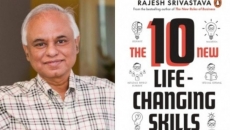Few documentary filmmakers have been as daring as Nisha Pahuja in portraying social issues in India. Her most notable film, The World Before Her focused on two young women following radically diverging paths: one wants to become Miss India, and the other, a radical Hindu nationalist. What stays with the viewer are not the differences but the similarities.
Pahuja’s latest film, To Kill a Tiger, zeroes in on the gang rape of a 13-year-old (“J”) in a small town in Jharkhand, Eastern India. While the community leaders recommend the girl marry one of the perpetrators to ‘restore her honour,’ her father, Ranjit, chooses to pursue justice through the courts. Tensions rise to the boiling point, but Ranjit remains steadfast in his decision to stand by his daughter.
To Kill a Tiger initially started as a different film, focusing on an NGO creating awareness among men and boys about women’s rights. Ranjit’s pursuit for justice was originally a pivotal portion of that movie, but his battle was so rare that it soon became all-encompassing. In an exclusive interview, Pahuja shares what it was like to direct To Kill a Tiger.
Documentary filmmakers have no intention to become part of their movies, but in your case, this eventually becomes untenable. Can you pinpoint when you realized you couldn’t remain on the sidelines?
Just by virtue of being a documentary filmmaker, you have an impact. We alter a place by entering it because the camera isn’t a neutral agent. With “To Kill a Tiger,” very early on, I realized I was having an effect on the village and the family. I was constantly asking Ranjit, the lawyers in the court case, and even the NGO if our presence was forcing a particular outcome.
As the day of the verdict approached, you and your team found yourselves in a dire situation. Were you surprised by the possibility of violence?
I knew this was a sensitive matter, and there was anger. Periodically I encountered resistance. You walked into the village and knew people were talking about you and weren’t happy that you were there. We had many conversations about how we were going to deal with confrontation. But when it actually happened, the feeling I had was shame. I was ashamed of myself. I knew we were doing the right thing—pushing back against a system of prejudice and a lack of justice—but I felt responsible; I was worried for my crew and scared for Ranjit’s family. I also thought, “Who am I to come into an ecosystem and unravel it?”
How do you keep it together when you hear arguments about marrying the girl to one of her attackers?
I grew up in that culture, with the same prejudices at the bottom of that argument—it’s the girl’s fault, what will people think—so I’m very familiar with those attitudes. I’m not offended because I’ve heard them so many times. I go into a more philosophical headspace: my main concern is how we will fix this deeply broken system. I used to see it as a male issue, but not anymore. I see it as a systemic problem in which men and women play pre-assigned roles. For the community, marrying the victim to the attacker is the only way to restore her honour. They think they’re helping the situation. Of course, we know it shouldn’t be like that. Human rights must trump everything else, and we must fight for that.
What was the most challenging aspect of making this documentary?
The first few months of filming with the family. I knew they weren’t being themselves and weren’t entirely comfortable with me. I was worried because the last thing you want is to make a film that feels inauthentic. I don’t make essay films; my films are all character-driven, and having a good relationship with the people I’m filming is key. I need them to trust me completely; otherwise, I don’t enjoy the process. The hardest part was to get Ranjit to that point. The kids were pretty good. With “J,” I was more uncomfortable filming her than she was with being filmed.
During this process, what did you learn as a filmmaker?
With this film, I really felt like a director, that I had what it takes to follow a story. It seems easy, but it takes a particular skill in the field, and I realized I had it: the ability to be proactive and reactive. You have to be very comfortable in chaos when working in a verité-driven documentary film. The other thing I learned is how complicated these stories are. You get into a minefield when you make this kind of film. You’re dealing with very vulnerable people, power dynamics, the repercussions of violence… It’s a big responsibility, and you’ve got to take it seriously.
Note: To Kill a Tiger is currently playing in festivals and will eventually be available for streaming on the National Film Board’s web platform NFB.ca.






.jpg)